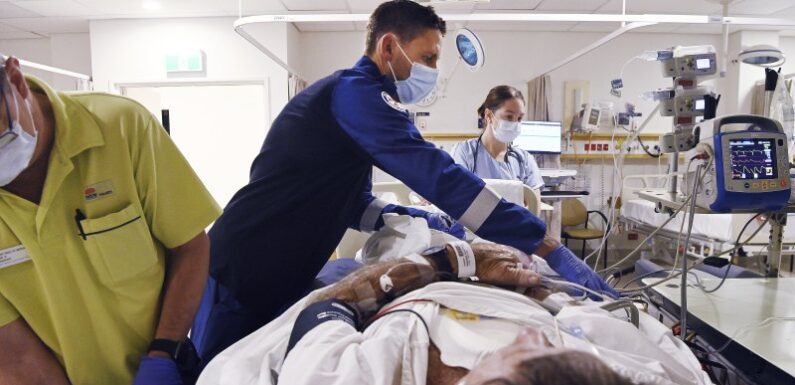
Save articles for later
Add articles to your saved list and come back to them any time.
Key points
- The median time between arriving at a NSW emergency department and leaving is now 3 hours and 36 minutes – the longest since records began in 2010.
- NSW Ambulance responded to 361,251 calls between July and September – the most of any three-month period on record.
- Health Minister Ryan Park will set up a taskforce charged with diverting patients away from hospitals and improve conditions for frontline healthcare workers.
- The NSW government is concerned emergency departments are overwhelmed with non-urgent patients, with 8.5 per cent of more than 3 million patients seen between July 2022 and June 2023 triaged in the lowest priority category.
Paramedics and emergency departments are under more pressure than ever as the NSW government pledges to divert patients away from hospitals and improve conditions for frontline healthcare workers.
Patients spent longer in the state’s emergency departments between July and September than any other three-month period on record, hospital data released on Wednesday reveals, with the median time between arriving and leaving now 3 hours and 36 minutes.
NSW Health Minister Ryan Park is setting up a taskforce to tackle growing emergency department wait times.Credit: Louise Kennerley
At the same time, NSW Ambulance responded to a record 363,251 calls, more than 181,000 of which were classified as emergencies requiring lights and sirens – the highest number recorded by the Bureau of Health Information for any three-month period since 2012.
The continued strain on frontline workers has prompted Health Minister Ryan Park to establish a taskforce charged with cracking down on bed block, improving the wellbeing of emergency department staff and patients, and preventing non-urgent patients ending up in hospital emergency departments and wards.
“Having people and their loved ones waiting around in our hospitals for lengthy periods of time is neither good for them, nor our staff, nor other patients,” Park said. “Where we can safely improve access to care and treatment – including timeliness – we will do it.”
In a survey released on Wednesday alongside the quarterly data, 45 per cent of patients in small rural hospitals in 2023 said they visited an emergency department with a condition they felt could have been treated by a GP.
Dr Clare Skinner, a Sydney-based emergency doctor and the immediate past president of the Australian College of Emergency Medicine, welcomed the announcement but said desperate patients and their carers should not be blamed for increased wait times.
“I really worry about a taskforce that states as one of its aims reducing unnecessary presentations,” she said. “These minor complaints do contribute to some of the workload, but it’s really about the people who have serious chronic conditions who deteriorate to the point they need emergency care.”
Skinner said a global shortage of health workers and the collapse of universal primary care are the major issues confronting the system, adding the taskforce should look closely at the recommendations from last year’s ramping inquiry.
“What we really need is deep funding and governance reform, and unless the taskforce is willing to address those issues, it will end up just another folder of recommendations sitting on a shelf somewhere,” she said.
Despite responding to a record number of calls, ambulance response times fell in the three months to September.
Australian Paramedics Association (NSW) president Brett Simpson said that, while it was pleasing to see ambulance response times decrease, it was a case of NSW Ambulance “squeezing more blood from the stone” when it comes to paramedics.
“There is still little being done to improve conditions for paramedics,” he said.
NSW emergency departments treats a higher proportion of non-urgent patients than any other state, according to national data released on Wednesday by the Australian Institute of Health and Welfare, with 8.5 per cent of more than 3 million patients seen between July 2022 and June 2023 triaged in the lowest priority category.
Compared to other states, NSW did have a relatively lower proportion of emergency and urgent priority patients, with 37 per cent of cases deemed urgent and 15 per cent of cases prioritised as emergency.
The Morning Edition newsletter is our guide to the day’s most important and interesting stories, analysis and insights. Sign up here.
Most Viewed in National
From our partners
Source: Read Full Article
